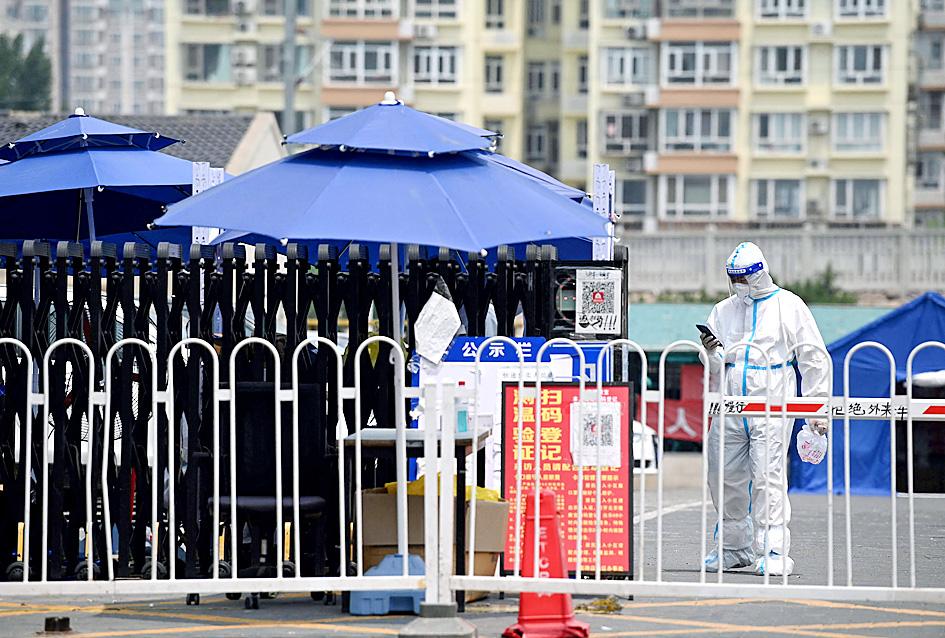Nearly a quarter of European companies in China are considering shifting their investments out of the country as COVID-19 outbreaks and lockdowns dim the outlook for the world’s second-largest economy, a survey showed.
About 23 percent of the businesses that responded to the survey are thinking of moving their current or planned investments away from China, a report released yesterday by the EU Chamber of Commerce in China said.
The survey was conducted at the end of April, when Shanghai was still in shut down and restrictions in places like Jilin Province disrupted business activity.

Photo: AFP
The number of European firms reassessing their options in China was the highest proportion in a decade, and also more than double the 11 percent recorded in a February poll, the chamber said, adding that 372 businesses responded to the April poll, whereas 620 responded to the February one.
China’s current policy — with no exit strategy for its zero tolerance approach to combating infections — “leaves headquarters no option but to look for other locations,” chamber vice president Bettina Schoen-Behanzin said. “The world does not wait for China.”
Of the firms considering a shift in investment, 16 percent said they were looking at relocating to Southeast Asia, while 18 percent said they were looking elsewhere in the Asia-Pacific region, 19 percent said Europe, 12 percent said North America and 11 percent said South Asia.
It is not clear when the property and the automotive sectors — two major drivers of the economy — would recover, Schoen-Behanzin said, adding that European businesses are re-evaluating their position in the market as they wait to see how long the uncertainty lasts.

SEEKING CLARITY: Washington should not adopt measures that create uncertainties for ‘existing semiconductor investments,’ TSMC said referring to its US$165 billion in the US Taiwan Semiconductor Manufacturing Co (TSMC, 台積電) told the US that any future tariffs on Taiwanese semiconductors could reduce demand for chips and derail its pledge to increase its investment in Arizona. “New import restrictions could jeopardize current US leadership in the competitive technology industry and create uncertainties for many committed semiconductor capital projects in the US, including TSMC Arizona’s significant investment plan in Phoenix,” the chipmaker wrote in a letter to the US Department of Commerce. TSMC issued the warning in response to a solicitation for comments by the department on a possible tariff on semiconductor imports by US President Donald Trump’s

The government has launched a three-pronged strategy to attract local and international talent, aiming to position Taiwan as a new global hub following Nvidia Corp’s announcement that it has chosen Taipei as the site of its Taiwan headquarters. Nvidia cofounder and CEO Jensen Huang (黃仁勳) on Monday last week announced during his keynote speech at the Computex trade show in Taipei that the Nvidia Constellation, the company’s planned Taiwan headquarters, would be located in the Beitou-Shilin Technology Park (北投士林科技園區) in Taipei. Huang’s decision to establish a base in Taiwan is “primarily due to Taiwan’s talent pool and its strength in the semiconductor

An earnings report from semiconductor giant and artificial intelligence (AI) bellwether Nvidia Corp takes center stage for Wall Street this week, as stocks hit a speed bump of worries over US federal deficits driving up Treasury yields. US equities pulled back last week after a torrid rally, as investors turned their attention to tax and spending legislation poised to swell the US government’s US$36 trillion in debt. Long-dated US Treasury yields rose amid the fiscal worries, with the 30-year yield topping 5 percent and hitting its highest level since late 2023. Stocks were dealt another blow on Friday when US President Donald

UNCERTAINTY: Investors remain worried that trade negotiations with Washington could go poorly, given Trump’s inconsistency on tariffs in his second term, experts said The consumer confidence index this month fell for a ninth consecutive month to its lowest level in 13 months, as global trade uncertainties and tariff risks cloud Taiwan’s economic outlook, a survey released yesterday by National Central University found. The biggest decline came from the timing for stock investments, which plunged 11.82 points to 26.82, underscoring bleak investor confidence, it said. “Although the TAIEX reclaimed the 21,000-point mark after the US and China agreed to bury the hatchet for 90 days, investors remain worried that the situation would turn sour later,” said Dachrahn Wu (吳大任), director of the university’s Research Center for